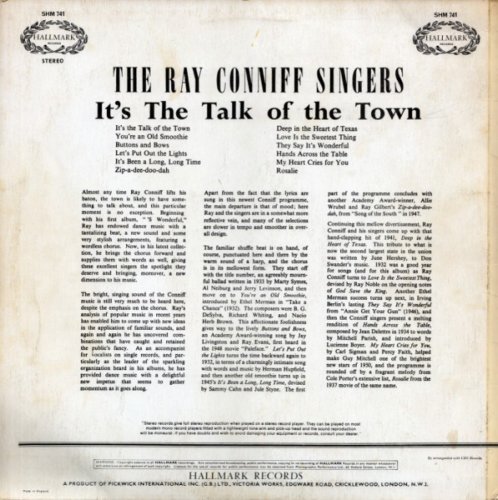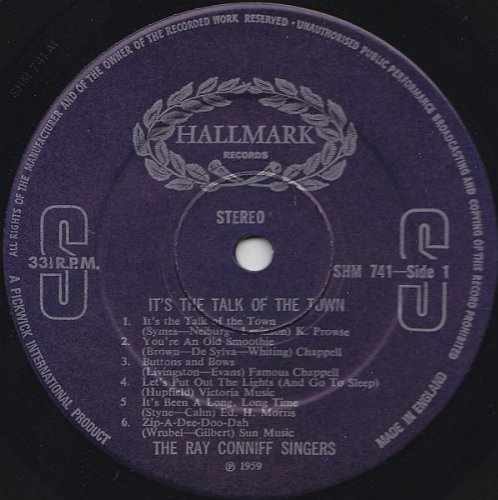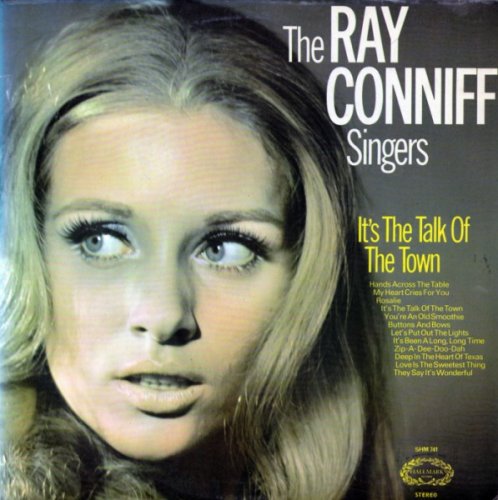
The Ray Conniff Singers - It's The Talk of the Town (1971) LP
BAND/ARTIST: The Ray Conniff Singers
- Title: It's The Talk of the Town
- Year Of Release: 1971
- Label: Hallmark Records (SHM 741)
- Genre: Jazz, Pop
- Quality: FLAC (image+.cue) 24/192
- Total Time: 00:29:05
- Total Size: 1.16 GB
- WebSite: Album Preview
Tracklist:
Side 1:
01. It's the Talk of the Town
Written-By – Neiburg, Levinson, Symes
02. You're an Old Smoothie
Written-By – De Sylva, Brown, Whiting
03. Buttons and Bows
Written-By – Livingston-Evans
04. Let's Put Out the Lights
Written-By – Hupfield
05. It's Been a Long,Long Time
Written-By – Styne, Cahn
06. Zip -a-dee-doo-dah
Written-By – Wrubel, Gilbert
Side 2:
07.Deep in the Heart of Texas
Written-By – Swander, Hershey
08. Love Is the Sweetest Thing
Written-By – Noble
09. They Say It's Wonderful
Written-By – Berlin
10. Hands Across the Table
Written-By – Delettre, Parish
11. My Heart Cries for You
Written-By – Sigman, Faith
12. Rosalie
Written-By – Cole Porter


Side 1:
01. It's the Talk of the Town
Written-By – Neiburg, Levinson, Symes
02. You're an Old Smoothie
Written-By – De Sylva, Brown, Whiting
03. Buttons and Bows
Written-By – Livingston-Evans
04. Let's Put Out the Lights
Written-By – Hupfield
05. It's Been a Long,Long Time
Written-By – Styne, Cahn
06. Zip -a-dee-doo-dah
Written-By – Wrubel, Gilbert
Side 2:
07.Deep in the Heart of Texas
Written-By – Swander, Hershey
08. Love Is the Sweetest Thing
Written-By – Noble
09. They Say It's Wonderful
Written-By – Berlin
10. Hands Across the Table
Written-By – Delettre, Parish
11. My Heart Cries for You
Written-By – Sigman, Faith
12. Rosalie
Written-By – Cole Porter
Almost any time Ray Conniff lifts his baton, the town is likely to have some-thing to talk about, and this particular moment is no exception. Beginning with his first album, " 'S Wonderful," Ray has endowed dance music with a tantalizing beat, a new sound and some very stylish arrangements, featuring a wordless chorus. Now, in his latest collec-tion, he brings the chorus forward and supplies them, with words as well, giving these excellent singers the spotlight they deserve and bringing, moreover, a new dimension to his music.
The bright, singing sound of the Conniff music is still very much to be heard here, despite the emphasis on the chorus. Ray's analysis of popular music in recent years has enabled him to come up with new ideas in the application of familiar sounds, and again and again he has uncovered com-binations that have caught and retained the public's fancy. As an accompanist for vocalists on single records, and par-ticularly as the leader of the sparkling organization heard in his albums, he has provided dance music with a delightful new impetus that seems to gather momentum as it goes along.
Apart from the fact that the lyrics are sung in this newest Conniff programme, the main departure is that of mood; here Ray and the singers are in a somewhat more reflective vein, and many of the selections are slower in tempo and smoother in over-all design.
The familiar shuffle beat is on hand, of course, punctuated here and there by the warm sound of a harp, and the chorus is in its mellowest form. They start off with the title number, an agreeably mourn-ful ballad written in 1933 by Marty Symes, Al Neiburg and Jerry Levinson, and then move on to You're an Old Smoothie, introduced by Ethel Merman in "Take a Chance" (1932). The composers were B. G. DeSylva, Richard Whiting, and Nacio Herb Brown. This affectionate foolishness gives way to the lively Buttons and Bows, an Academy Award-winning song by Jay Livingston and Ray Evans, first heard in the 1948 movie "Paleface." Let's Put Out the Lights turns the time backward again to 1932, in terms of a charmingly intimate song with words and music by Herman Hupfield, and then another old smoothie turns up in 1945's It's Been a Long, Long Time, devised by Sammy Cahn and Jule Styne. The first part of the programme concludes with another Academy Award-winner, Allie Wrubel and Ray Gilbert's Zip-a-dee-doo-dah, from "Song of the South " in 1947. Continuing this mellow divertissement, Ray Conniff and his singers come up with that hand-clapping hit of 1941, Deep in the Heart of Texas. This tribute to what is now the second largest state in the union was written by June Hershey, to Don Swander's music. 1932 was a good year for songs (and for this album) as Ray Conniff turns to Love Is the Sweetest Thing, devised by Ray Noble on the opening notes of God Save the King. Another Ethel Merman success turns up next, in Irving Berlin's lasting They Say It's Wonderful from "Annie Get Your Gun" (1946), and then the Conniff singers present a melting rendition of Hands Across the Table, composed by Jean Delettre in 1934 to words by Mitchell Parish, and introduced by Lucienne Boyer. My Heart Cries for You, by Carl Sigman and Percy Faith, helped make Guy Mitchell one of the brightest new stars of 1950, and the programme is rounded off by a fragrant melody from Cole Porter's extensive list, Rosalie from the 1937 movie of the same name.
"Stereo records,give full stereo reproduction when played on a stereo record player. They can be played on most modern mono record players fitted with a lightweight tone arm and pick-up head and the sound reproduction will be monaural. If you have doubts and wish to avoid damaging your equipment or records, consult your dealer."
The bright, singing sound of the Conniff music is still very much to be heard here, despite the emphasis on the chorus. Ray's analysis of popular music in recent years has enabled him to come up with new ideas in the application of familiar sounds, and again and again he has uncovered com-binations that have caught and retained the public's fancy. As an accompanist for vocalists on single records, and par-ticularly as the leader of the sparkling organization heard in his albums, he has provided dance music with a delightful new impetus that seems to gather momentum as it goes along.
Apart from the fact that the lyrics are sung in this newest Conniff programme, the main departure is that of mood; here Ray and the singers are in a somewhat more reflective vein, and many of the selections are slower in tempo and smoother in over-all design.
The familiar shuffle beat is on hand, of course, punctuated here and there by the warm sound of a harp, and the chorus is in its mellowest form. They start off with the title number, an agreeably mourn-ful ballad written in 1933 by Marty Symes, Al Neiburg and Jerry Levinson, and then move on to You're an Old Smoothie, introduced by Ethel Merman in "Take a Chance" (1932). The composers were B. G. DeSylva, Richard Whiting, and Nacio Herb Brown. This affectionate foolishness gives way to the lively Buttons and Bows, an Academy Award-winning song by Jay Livingston and Ray Evans, first heard in the 1948 movie "Paleface." Let's Put Out the Lights turns the time backward again to 1932, in terms of a charmingly intimate song with words and music by Herman Hupfield, and then another old smoothie turns up in 1945's It's Been a Long, Long Time, devised by Sammy Cahn and Jule Styne. The first part of the programme concludes with another Academy Award-winner, Allie Wrubel and Ray Gilbert's Zip-a-dee-doo-dah, from "Song of the South " in 1947. Continuing this mellow divertissement, Ray Conniff and his singers come up with that hand-clapping hit of 1941, Deep in the Heart of Texas. This tribute to what is now the second largest state in the union was written by June Hershey, to Don Swander's music. 1932 was a good year for songs (and for this album) as Ray Conniff turns to Love Is the Sweetest Thing, devised by Ray Noble on the opening notes of God Save the King. Another Ethel Merman success turns up next, in Irving Berlin's lasting They Say It's Wonderful from "Annie Get Your Gun" (1946), and then the Conniff singers present a melting rendition of Hands Across the Table, composed by Jean Delettre in 1934 to words by Mitchell Parish, and introduced by Lucienne Boyer. My Heart Cries for You, by Carl Sigman and Percy Faith, helped make Guy Mitchell one of the brightest new stars of 1950, and the programme is rounded off by a fragrant melody from Cole Porter's extensive list, Rosalie from the 1937 movie of the same name.
"Stereo records,give full stereo reproduction when played on a stereo record player. They can be played on most modern mono record players fitted with a lightweight tone arm and pick-up head and the sound reproduction will be monaural. If you have doubts and wish to avoid damaging your equipment or records, consult your dealer."


Jazz | Vocal Jazz | Pop | FLAC / APE | HD & Vinyl
As a ISRA.CLOUD's PREMIUM member you will have the following benefits:
- Unlimited high speed downloads
- Download directly without waiting time
- Unlimited parallel downloads
- Support for download accelerators
- No advertising
- Resume broken downloads


